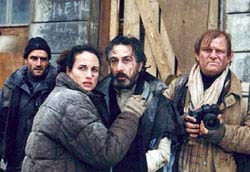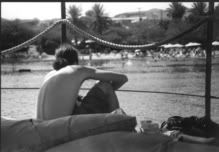Murder, Redemption and Education on Genocide

No words can cover the pain that madness and inhumanity experienced by people confronted with massive disruptions in lives caused by war, and genocide in particular. Forms of expression trying to deal with these stories like photographs, histories and movies are all ways to counteract the violence itself, mostly by reenactement, retelling and exposing this dark side of the human form. All people viewing these feel a sense of human rights. It is this sense that unites humanity, at least in a cultural way.
Over the last period i have seen some excellent movies on the subject. Sometimes in April is, like Hotel Rwanda, a horrific account of the Rwandan "civil" war and the failure of the rich and powerfull west to safeguard the innocent people. The role of the media and Hate-Radio is once again emphasized and the vulrenability of peaceful people against the willingness of the once (supposedly) supressed to join against the common enemy are depicted in a profound manner. In contrast to Hotel Rwanda, this movie brings in the History dimension, of how a society, such as Rwanda must try and and continue after slaughter and crime. Moral standards and the questions of guilt and punishment are dealt with within the context of the international tribune. It is however imaginable this problem also exists on a more local scale as well.

Harrisons Flowers is a movie about an American war-photographer and his family. In 1991 he goes for one more, final, mission to Yugoslavia, to take pictures of what his boss at Newsweek dubs "Ethnic Incidents". The result is that he is supposedly dead. His wife has a hard time believing this and she decides to go to Vukovar and find him. Here the movie suddenly switches from a personal drama to an uncensored vision of war. With a group of photographers she tries to reach Vukovar. In the end, this city is the sight of the cleansing. Streets and buildings are ruined, smoke is everywhere, there is shouting, pain and gunfire without end. This American account of war is still fitted for the eye and does not extend to a level of schock that would truly upset the viewer, eventhough it contains many extremely upsetting violence.
Former Yugoslavia has been torn to pieces. People have fought for several hopes and goals. People have survived various motives for killing. Villages have been conquered and reconquered. International missions have bombed and moved in to save the last scene of ethnic cleansing, Kosovo, where NATO forces remain. Slovenia has joined the EU, Croatia is in the pipeline and Serbia has been punished by the Union for their inaction dealing with warcriminals. Greeks fear their Albanian minorities, Macedonia cannot be without the "Former Yugoslav Republic of"-prenom and Montenegro has left the sinking ship op Serbia. A fabulous account of current visions on the recent conflict has just featured on Dutch Television. The episode can be streamed from this website. This episode is part of a travel documentary called "Tracks", in which Rob Hof (the maker) travels from Asia to Europe and talks to the ordinary people. Extraordinay insights is what follows.
I am left here in this piece of the world where peace reigns, eventhough it is forces to share some of its reign with fear, xenophobia, segregation and discrimination. The rule of law, human rights and democracy is the West greatest export, one has to believe. This is the result of WW2. Education on this war and the cold war that has followed is still a major part of curricula, but why? And how can students connects the insights provided by movies and documentaries on other atrocities in the world with their own past. I am confident that people share the same emotion of repulsion when confronted with massmurder, factual repitition of the Holocaust in Western Education may become superfluous. Moreover connection the Holocaust with current and recent warcrimes may elevate the sense of Human Rights in the public sphere, in stead of leaving a bitter taste and provoke national pride in Europe.



 It was after the Gulf War that his mother and boyfriend at the time decided to 'descend' from the Holy land and set sail towards The Hague, being the birthplace of Even-Zohars
mother. Jonathan managed well in Grade school and High school, so the
next logical step was the University, the infinite source of knowledge.
After speculating on Industrial Design, Social Geography and Journalism
it was the study of History at Leiden that turned out to be his
decision.
It was after the Gulf War that his mother and boyfriend at the time decided to 'descend' from the Holy land and set sail towards The Hague, being the birthplace of Even-Zohars
mother. Jonathan managed well in Grade school and High school, so the
next logical step was the University, the infinite source of knowledge.
After speculating on Industrial Design, Social Geography and Journalism
it was the study of History at Leiden that turned out to be his
decision.
 Now, four years into the study, matters have only become more
complicated as this student advances towards World History; meaning the
complete array of fields a historian may implement in explaining the
entire past of the entire world to fellow men. It is especially the
philosophical character of World History that attracted Jonathan.
Now, four years into the study, matters have only become more
complicated as this student advances towards World History; meaning the
complete array of fields a historian may implement in explaining the
entire past of the entire world to fellow men. It is especially the
philosophical character of World History that attracted Jonathan.
 For him there is only one question that stands above all others like a
lonely chuchtower in some Flemish village, which asks the cause of the
Western Rise and the Industrial Revolution. Furthermore, the role of the
European self- and worldimage throughout its history may explain the
role of Europe in the Eurasian Human Web. Thus, the direct contact
between Islam and Christianity is to be investigated. Were Muslims
constantly on the verge of invading Europe? How did Arab people perceive
the 'barbaric' Christians? How was Science spread and how did the West
pick up knowledge form the Arabs or from further East? Europe and the
Islam are still not at peace, certainly not in the mind.
For him there is only one question that stands above all others like a
lonely chuchtower in some Flemish village, which asks the cause of the
Western Rise and the Industrial Revolution. Furthermore, the role of the
European self- and worldimage throughout its history may explain the
role of Europe in the Eurasian Human Web. Thus, the direct contact
between Islam and Christianity is to be investigated. Were Muslims
constantly on the verge of invading Europe? How did Arab people perceive
the 'barbaric' Christians? How was Science spread and how did the West
pick up knowledge form the Arabs or from further East? Europe and the
Islam are still not at peace, certainly not in the mind.
0 Comments:
Post a Comment
<< Home